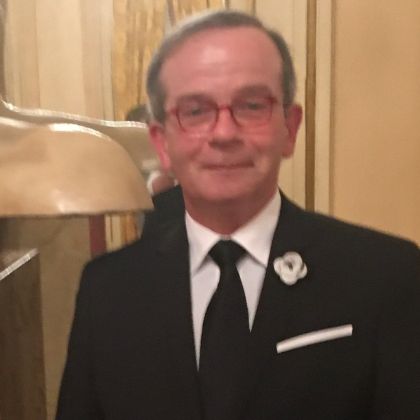Odyssey Opera opened last season with what was, in effect, the world premiere of Gounod's La Reine de Saba, restoring music cut both before the first performance and for subsequent revivals. This year they have similarly exhumed Saint-Saëns’ Henry VIII. Aided by musicologist Hugh MacDonald’s archival research, this concert performance restored the grand ensemble (a septet in the score but featuring eight singers) meant to close the vocal portion of Act 2, the first scene of Act 3, sections of individual arias and duets, and the complete seven-part Act 2 ballet for approximately 51 minutes of additional music. Thanks to a typo or an excess of optimism, the program gave a running time of three and a half hours. The performance actually ran an hour longer, concluding shortly after midnight.
Léonce Détroyat and Paul-Armand Silvestre based their libretto on Calderón’s play La cisma de Inglaterra, which introduces the plot complication of a pre-existing affair between Anne Boleyn and the Spanish ambassador to Henry’s court, Don Gómez de Feria (an anachronism since Gómez was actually ambassador during Elizabeth’s reign). As the opera opens, he confides to the Duke of Norfolk that he has entrusted Queen Catherine with Anne’s letter declaring her love for him. The letter becomes the ticking time bomb which detonates in unexpected fashion in the final scene. The outline of what follows is substantially historically accurate save for a final encounter between Anne and Catherine. The three principals are drawn with a psychological complexity which sets them apart from the cardboard cutouts of other grand operas. Henry is volatile, impulsive, capricious and dangerous. Desire once satisfied becomes a poisoned chalice which leaves him consumed by paranoia in the final act. He ends the opera with a chilling vow that “the axe will fall” if he finds he has been “mocked”. The ambitious Anne resists Henry’s protestations and only succumbs when he changes tack and turns sinister to corrupt her with an offer of marriage and a queen’s crown. Yet, once her ambitions are fulfilled, she realizes she is more victim than victor and as powerless and reliant on the whims of a sociopath as Catherine before her. Catherine herself has all of the composer’s and librettists’ sympathy. She is noble, honest and self-sacrificing. On the threshold of death she refuses to yield to the desire for revenge and throws Gómez’s incriminating letter into the fire, depriving the king of proof of the doubts gnawing him to distraction.
Ellie Dehn sang Catherine at Bard in 2012. That familiarity allowed for complete immersion dramatically and finesse vocally. Sensitive phrasing, autumnal colors, the ability to float a phrase, and a velvety sheen in softer passages, such as her Act 4 regrets about never seeing Spain again, imbued her portrayal. Had she been in the original cast, the creators might well have retitled the opera, Catherine of Aragon. That takes nothing away from Michael Chioldi’s dramatic and vocal commitment, his imposing and ultimately menacing Henry, and his commanding bronze baritone. In the first two acts, Chioldi was able to generate sympathy neither the composer nor librettists granted Henry through carefully judged use of word painting and phrasing as the king grapples with a passion he fails to dominate. Hilary Ginther’s warm, sensuous mezzo was perfect for Anne and an appealing contrast to Dehn in her duets with Catherine. Her voice reflected her character’s growing awareness of the consequences of her choice by, at times, losing its warmth and colors. Save for a scrape or two, Yeghishe Manucharyan’s tireless, ringing tenor as Don Gòmez was a bright standout in a cast ruled by lower voices.
Local stalwarts Matthew DiBattista as Surrey and David Kravitz as Norfolk anchored a strong supporting cast with Kravitz a substitute seemingly so last minute not even a program insert was possible. He was immediately recognizable to opera and BSO patrons, but his entrance still generated a notable flurry of page turning in the audience. Kevin Deas made a noteworthy Odyssey debut as Cardinal Campeggio, the papal legate. His solo about the fate of misguided princes which closes the Act 3 scene usually cut was a vocal highlight of the evening.
Both chorus and orchestra were up to Odyssey’s high standards. By now they have the grand opera style and the acoustic requirements of Jordan Hall at their fingertips. Gil Rose supported his singers, created dramatic tension in the build-up to the grand climaxes, and gave the orchestra an opportunity to shine in the ballet which incorporates folk tunes Saint-Saëns found in London archives.
The Tudors provide Odyssey’s unifying theme this season. Works by Britten, German, Pacini, Rosner and Rossini dominated by the queens of the era follow. Performed at this level, they promise a memorable season.


